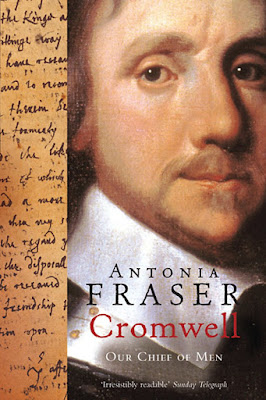Bookshot #135: Cromwell, Our Chief of Men
I've long been fascinated with the English Civil War- I'm not sure where that started, but a possible summer vacation spent in the Cotswolds, combined with a youthful adminration for the fashions of the Cavaliers especially is probably what started it at all. But the English Civil War wasn't the neat and tidy conflict that it's American counterpart was--- quite the contrary it was messy, so when I decided I wanted to learn more about it, I picked up two biographies (again, on another UK trip)- one on Charles II and the other on Oliver Cromwell, both written by Antonia Fraser.
Having read both, I'm still not sure I know it as well as I know the American Civil War, but I do have a greater understanding of the conflict and that is thanks in large part to the immense tomes on the two men diametrically opposed to each other throughout: Charles II and Cromwell. Now, I've already read Charles II's biography, so I tucked into this one (I think this was the second or third attempt I've made to crack it- similiar to Charles II) and actually made it all the way through.
If there is one thing Fraser is excellent at, it's really giving us a sense of the character of Cromwell and most importantly, perhaps, the events that made the man growing up and forged him to be- I don't know if 'the right man for the moment of history' is the right phrase, but it feels right. Reading this, I'm not sure anyone but Cromwell could have gotten the job done- and I'm near certain that there was no one with Cromwell's authority that could have run the country as Lord Protector.
He was born in Huntingdon to while not what I would say would be a wealthy family, she decrees that he was, 'by birth, a gentlemen' and I feel like that fits. Cromwell wasn't high up in the aristocratic tree, but he wasn't common as muck either- the idea of a middle class was probably a century or two from springing to reality, but if it had been around back then, Cromwell feels either solidly or upper middle class in his background. As such, he manage to be enough of a member of the gentry to get elected to Parliament and work his way up from there while at the same time being close enough to the broad mass of the common folk to at least be sympathetic to some of their concerns.
When the conflict breaks out, you see some of this attitude emerge and Cromwell makes his way up through the Parliamentary ranks. I'm not an expert on British military history, but I do know that in many instances, soldiers get killed because commanders are chosen for their aristocractic connections rather than military skill. Cromwell challenged the form and embraced the latter which lead to the formation of his New Model Army-- and brought such innovations to cavalry as running them in three ranks and pressing forward to rely more heavily on impact rather than firepower and he liked to keep his troops together rather than having them lose cohesion in pursuits, which allowed them to react to military developments faster.
If the book overall has a fault, it's probably the immediate aftermath of King Charles I's death and the formation of the Protectorate. The Civil War parts of the book were interesting and engaging-- and the seeds of some of the ideas that popped up in Revolutions in the subsequent centuries were very much on display with the Levellers and their more radical counterparts the Diggers-- plus the delicate task of keeping soldiers paid and happy which didn't always work quite so well for either side.
After all is said and done however, the book bottoms out for a few long, interminable chapters before getting interesting again toward the end when Parliament is summoned once more and officially offers Cromwell the Crown-- there's also much debate about bringing back the House of Lords, which had been abolished in the aftermath of the Civil War- and that eventually does happen, but the great drama of the final act of Cromwell's life is the 'will he or won't he' about accepting the crown- which he ultimately doesn't. Fraser correctly points out, I think (she's convinced me by this point) that Cromwell was probably the only person in England at the time who had the authority to refuse the Crown and yet still hold power- which says a lot, I think about the man.
If he had a misstep toward the end of his life, it was probably being unclear about who he wanted his successor to be-- seems like Henry would have been a better choice than Richard (whose unfortunate nickname of Tumbledown Dick should tell you something about his tenure as Lord Protector-- it was short) but Cromwell kept everyone guessing until almost the last minute and then he was gone and England was headed toward the Restoration and the return of King Charles II.
Fraser does a complete and thorough job on Cromwell, I think. I haven't done a thorough examination of all the other scholarship on Cromwell, but this feels balanced. She's not afraid to talk about his bouts of temper. Doesn't spare us any details of his time in Ireland- including the biggest blot on his military career, the massacre at Drogheda and really seems intent on drilling down to give us as fair a potrait of the man himself as possible and I think on balance, she succeeds at her aim.
Overall: If you want to know about Cromwell, you can't go wrong with this doorstop. It does get a bit plodding and dull through the middle third or so, but picks up at the end. My Grade: ** 1/2 out of ****.



Comments
Post a Comment